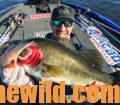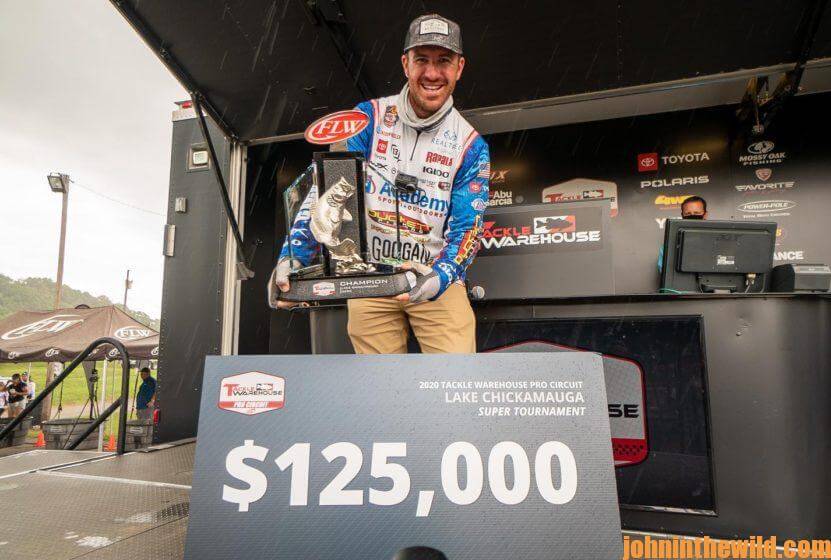Editor’s Note: Jacob Wheeler of Harrison, Tennessee, is probably one of the most-unusual yet successful tournament bass fishermen I’ve ever met. Arriving 10-years ago on the professional bass-fishing circuits at the age of 20, he’s earned more than $2.5 million in tournament winnings – not counting the income he’s also received from his sponsors. He’s currently ranked No. 1 world-wide on BassFan (http://www.bassfan.com/). Wheeler is the first tournament bass fisherman I’ve ever met who runs five different fish finders from three different companies on his boat. Wheeler’s wife is Alicia, and his 1-year old daughter is Olivia. To learn more, check out his Facebook page at https://www.facebook.com/wheelerfishing/.
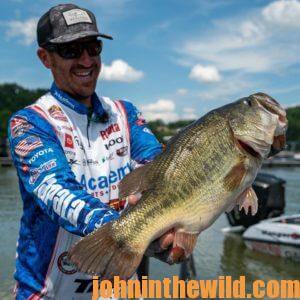 Next, I fished the Tackle Warehouse Pro Circuit Super Tournament on Lake Chickamauga in Tennessee (https://www.flwfishing.com/tournaments/2020-06-23-chickamauga-super-tournament). There were over 200 boats entered i n this competition because so many pro anglers had missed fishing some of tournaments due to the COVID-19 pandemic. But this also resulted in more prize money and television time, so I wasn’t bothered. The prize money was on a decreasing scale from $125,000 for the first-place fisherman all the way down to $10,000 for 100th place.
Next, I fished the Tackle Warehouse Pro Circuit Super Tournament on Lake Chickamauga in Tennessee (https://www.flwfishing.com/tournaments/2020-06-23-chickamauga-super-tournament). There were over 200 boats entered i n this competition because so many pro anglers had missed fishing some of tournaments due to the COVID-19 pandemic. But this also resulted in more prize money and television time, so I wasn’t bothered. The prize money was on a decreasing scale from $125,000 for the first-place fisherman all the way down to $10,000 for 100th place.
One of the advantages I had on fishing Lake Chickamauga is that I knew this lake pretty well. After all, my house was only two blocks away. However, I also knew that this would be a tough tournament to win. Yes, there was a good number of bass in the lake, but I’d be fishing against some of the best bass fishermen in the nation. I knew that it would be easy for them to find some of the good spots on the lake, so I chose not to fish in any of my usual areas for this tournament. Instead, I fished in places I’d never fished before in the grass and in shallow and deep water. During practice, when I found a school of bass, I marked the area as a waypoint instead of casting a bait on my reel, so that my bait wasn’t recognizable to the bass on competition day. Also, a lot of spectators were following me, so I was thankful that my fish finders didn’t have big neon lights that blinked every time I dropped a waypoint.
Surprisingly, on competition day, a lot of the community holes (areas that every local angler knows about and fishes) didn’t have very-many people on them. I spent a lot of my time fishing in unique places like isolated brush piles and areas where the grass came together on a hard bottom in deep water. Since each one of these patches only held about one or two bass, I caught those quickly and moved on to other places. Because I fished in many-different spots and didn’t stay in one region for too long, the spectators didn’t really know the pattern that I was running until the last two days of the competition. A bass tournament is a lot like a football game in that often no one really pays attention to the game until the last quarter. By then, all of the spectators are involved and hoping to catch the win.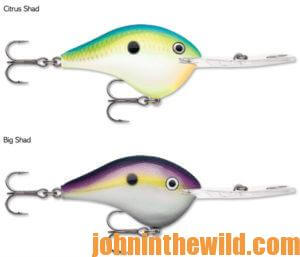
For the most part, I didn’t really have any problems with the spectators. I was able to fish in the sites that I wanted, and I enjoyed getting cheered on by some of them. The only thing that bothered me was when one of them would come in and start fishing a spot right after I left it.
That stings a little bit, but that spectator had as much right to fish at that site as I did. As much as I wanted to say something in those situations, I had to bite my tongue and continue being a good representative for the companies that sponsored me. The only way to fix this problem was to have several places where you could fish and find big bass.
On the last day of the Chickamauga tournament, I was leading by about 5 pounds. I would graph over a place before I fished it and fished as patiently as I could with my crankbaits. I caught most of my fish on a Rapala DT-20 (https://www.rapala.com/), which is a deep-diving crankbait that not many people used. Knowing this, I figured that the bass might be more likely to eat it, since they didn’t see that particular lure that often. This bait had a little-tighter action (wobble) than other deep-diving baits had, and I felt like I got more bites on this lake because the bass on most of the lakes we fished received so much fishing pressure from all of the other deep-diving crankbaits. The two colors I used were Citrus and Big Shad – prototype colors that the bass probably hadn’t ever seen before and should be released later in this summer of 2020.
 During the last hour of the tournament, I caught an 8 pounder on the Citrus Shad bait. Although, Chickamauga is a great smallmouth lake, all of the bass I weighed in for this tournament were largemouths. The tournament only allowed anglers to weigh one smallmouth in per day, and that fish had to be more than 18-inches long. I concentrated on fishing for largemouths. When I caught an 8-pound largemouth, I knew that I almost had more than 26 pounds of largemouth for a five-fish limit. Since I was already in the lead by 5 pounds, I knew someone would have to catch a really-big bag of bass to beat me. One of the fishermen, Jason Ray, was 4 pounds, 12 ounces behind me, and I realized he’d have to have more than 26 pounds of bass to take over the lead. I also knew he had a chance of beating me because he had caught five bass that weighed a total of 27 pounds on the second day of the tournament. I gave myself plenty of time to get back to the weigh-in because I remembered how being late by 10 minutes had cost me a Rookie-of-the-Year title. I felt I had a pretty-good chance to win the tournament. In the end, I went home as the Champion of the FLW Super Tournament with a $125,000 check.
During the last hour of the tournament, I caught an 8 pounder on the Citrus Shad bait. Although, Chickamauga is a great smallmouth lake, all of the bass I weighed in for this tournament were largemouths. The tournament only allowed anglers to weigh one smallmouth in per day, and that fish had to be more than 18-inches long. I concentrated on fishing for largemouths. When I caught an 8-pound largemouth, I knew that I almost had more than 26 pounds of largemouth for a five-fish limit. Since I was already in the lead by 5 pounds, I knew someone would have to catch a really-big bag of bass to beat me. One of the fishermen, Jason Ray, was 4 pounds, 12 ounces behind me, and I realized he’d have to have more than 26 pounds of bass to take over the lead. I also knew he had a chance of beating me because he had caught five bass that weighed a total of 27 pounds on the second day of the tournament. I gave myself plenty of time to get back to the weigh-in because I remembered how being late by 10 minutes had cost me a Rookie-of-the-Year title. I felt I had a pretty-good chance to win the tournament. In the end, I went home as the Champion of the FLW Super Tournament with a $125,000 check.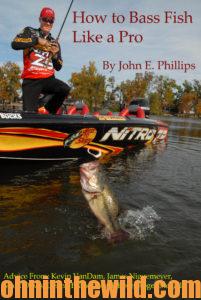
To learn more about bass fishing, check out John E. Phillips’ book, “How to Bass Fish Like a Pro,” at http://amzn.to/YpoJvD, available in Kindle and print versions, and Click here for the Audible link.
Tomorrow: Jacob Wheeler’s Equipment

